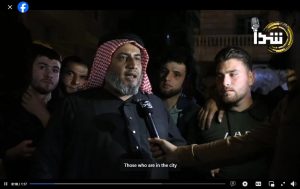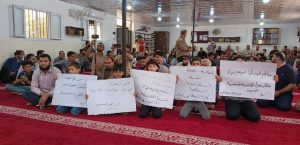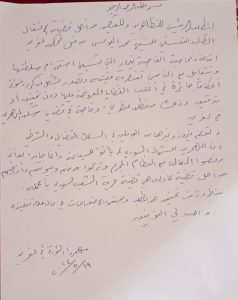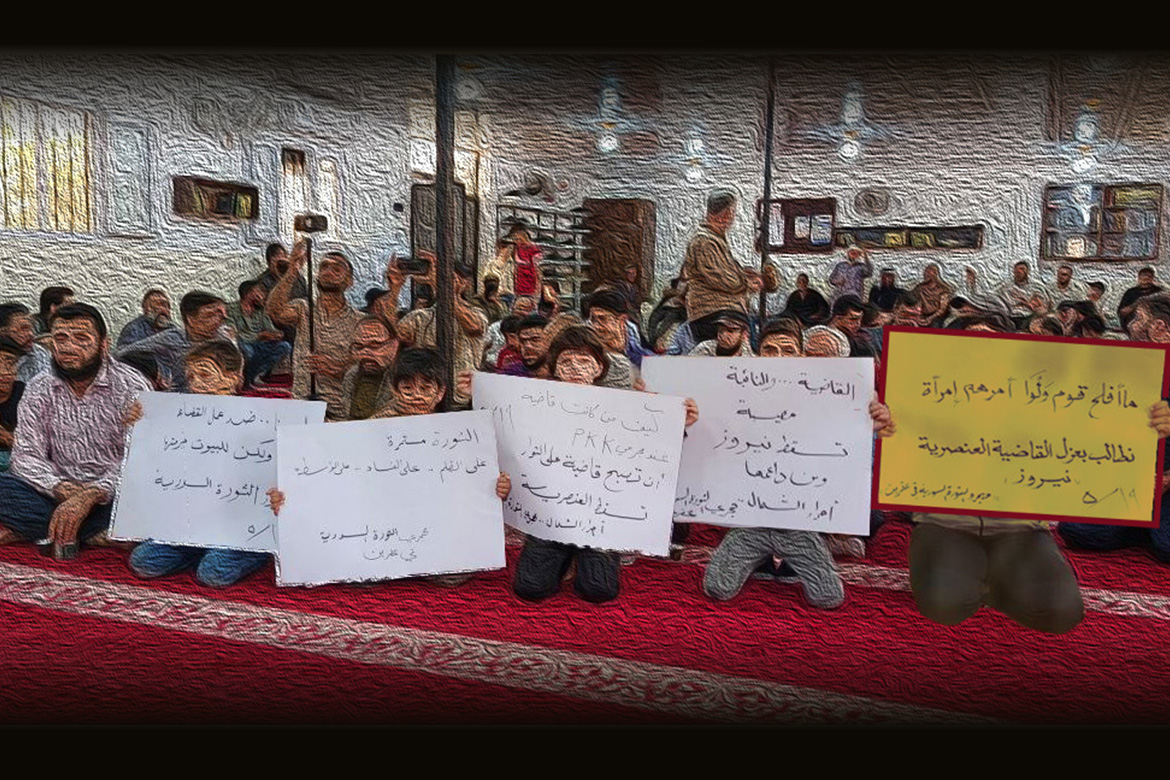The life of Newroz Hisso, Afrin Tribunal’s Public Prosecutor/Prosecutor and her family’s is in great danger due to the increase of threats and open incitement campaigns against her lately. No legal protection has been provided to Hisso following the court’s decisions to end the seizure of houses belonging to Kurdish families and restituting them to their original owners.
Afrin court that was established following the Turkish occupation of Afrin in 2018 and run by the opposition Syrian Interim Government (SIG), has ruled on more than 150 cases of usurpation of real property and ordered the evacuation of the houses belonging to Kurdish victims. However, tremendous challenges have faced the implementation of the court decisions as a result of the intervention of factions of the opposition Syrian National Army (SNA) and their refusal to return the rights to their owners.
Hisso works as a Prosecutor in Afrin Tribunal, and not as a ‘’Judge’’ as was rumored in the public threats and incitement campaigns against her by those opposing the court’s decisions. These opponents include family members of armed factions, as well as displaced persons from other regions in Syria who occupy seized homes with the support and protections of those armed factions, and refuse to return them to their Kurdish owners.
Information gathered by Synergy Association for Victims indicates that the threats and incitement campaigns organized against the human rights defender “Newroz Hisso” have a sectarian nature. She is one of dozens of employees at Afrin Court, besides issuing judicial decisions is not part of her duties. However, she was targeted solely by those who opposed the courts verdicts because she is Kurdish, as were the victims whose rights the court ruled should be restored.
Hisso’s case reflects the absence of legal protection for human rights defenders in the Turkish-occupied territories which are characterized with armed chaos, insecurity, and the escalation of human rights violations committed by the Turkish-supported and funded SNA’s factions. Therefore, there is a pressing need to take measures to protect and promote human rights, achieve justice for the victims and ensure the safety of those responsible for enforcing the law in conflict areas.
Continuous Threats:
Since early 2024, there has been an ongoing incitement campaign against Hisso, the Prosecutor in Afrin Tribunal. The intensity of this campaign has markedly escalated since May 19th, with sit-ins and demonstrations demanding her dismissal and threatening to hold her accountable. This has been accompanied by fears that the threats may escalate to murdering.
A 20-second video was circulated in mid-July showing two men talking; the first one was thanking the joint forces (comprising al-Hamzat Division and Sultan Suleiman Shah/al-Amshat), while the second one, a member from the forces, was speaking to him from behind the camera and confirming to him that the forces has returned him and his family to the house and that no one ever can get them out, urging the first man to contact them in case anyone object that. Synergy verified that the mentioned house belongs to a Kurdish woman and that Afrin Tribunal had issued an order to vacate and return it to her. Forces of the Civil Police were working on this, however, the joint forces intervened to intimidate the woman, remove her from the house, and reinstate the man shown in the video, who has been occupying the house with his family since 2018 with the support of armed factions.
On May 28th, Shada TV broadcasted a video of an interview with a man known as Sheikh Abo Khalid al-Ageidi, Secretary of the Tribal Council in Damascus Countryside, with several persons gathered around him. Al-Ageidi stated that they took to the streets to reject the decisions of Afrin Tribunal. He called for the removal and expulsion of Hisso from the region, accusing her of working with the Kurdistan Workers’ Party (PKK), the most common accusation against the Kurdish civilians who are arrested and tortured at the hands of the opposition SNA’s factions in Afrin strip.

A screenshot taken from the video published by Shada TV regarding the demonstration in Afrin City on May 28th, 2024.
Furthermore, a Telegram channel belonging to Kabous Jarablous/Jarablus Nightmare (followed by 72,000 followers) posted more than ten posts in which it threatened, insulted and verbally abused Hisso with words of sexual nature, accusing her of collaborating with the PKK. The posts, each was viewed by 30,000 followers on average, were accompanied by comments calling for physical and sexual violence against her as well as murder.[1]
Syrian displaced persons and migrants present in Afrin City have also circulated via WhatsApp voice messages on groups, containing hundreds of members, calling to mobilize and demonstrate against Hisso, demanding her dismissal, and accusing her of being hostile to the displaced people in the area.
Moreover, a sit-in against Hisso was organized in a mosque in Afrin City by scores of the so-called “The Revolution’s Migrants”. The protestors raised banners reading “A nation that entrusts its affairs to a woman will not succeed- we demand the removal of the racist judge Newroz Hisso”, in a sign that underestimates the importance of women’s labor, particularly in the public-facing roles, and indicating that Hisso is racist because she, while performing her duties in the court, had defended the rights of Kurdish victims against the displaced and the refuges from elsewhere in Syria.

A part of the sit-in organized against Hisso in a mosque in Afrin City- Source: Social Media.
The analysis of the information gathered by Synergy indicate that the participants in these campaigns, including families of the opposition SNA fighters and some displaced persons from other Syrian regions to Afrin, believe it is their right to continue seizing and occupying the homes and properties of Kurdish residents of Afrin for their own benefit. They assert that no one has the right to remove them and return the properties to their rightful owners. These individuals, identifying themselves as “The Revolution’s Migrants” stated in a signed letter dated May 19th, their calling for the dismissal and accountability of Hisso, adding that they did not come to Afrin as tourists, rather, they are there because they had refused to sign reconciliation agreement with the criminal Syrian regime. They said that they had left their cities, houses, and lands for a just cause, which is the cause of freedom for the whole Syrian people. Therefore, they believe they have the right to seize the homes and properties of other victims, in this case, the Kurds of Afrin.

An image shows a letter signed by “The Revolution’s Migrants” demanding the dismissal and accountability of Hisso. Photo Credit: Social Media.
On May 30th, 2024, the court met with a delegation of dignitaries and tribal leaders in Afrin, at their request. The delegation that comprised more than 10 individuals demanded mainly to remove the Prosecutor Newroz Hisso, overrule the court’s decision to evacuate all houses, and threatened to continue their demonstrations and sit-ins in case their demands were not met. However, the court has not responded to these demands or issued any decisions regarding them thus far.
Absence of Legal Protection:
Synergy spoke to two persons close to Hisso’s family and others working with her in the same court and learned that the Prosecutor remained on duty and never missed performing her tasks in the court despite the threats. However, she and her family are worried about their lives because of the continuous threats and incitement campaigns against her.
Hisso lives in Afrin City along with her husband and two little kids. Public incitement and threats against her has caused panic for her and her family, notably in light of the armed chaos and insecurity in the Turkish-occupied territories and the violations perpetuated by the SNA’s factions against civilians on a daily basis, with the lack of accountability and continued impunity.
According to a close source from Hisso’s family, the SNA’s factions are attempting to fight Hisso and set a trap for her legally, as they have been reportedly searching through her past and current files, seeking any information that might suggest her dealings with the Autonomous Administration, which is the most common accusation against the Kurdish people in the Turkish-occupied regions administered by the opposition factions.
“Hisso has not stopped her work, but due to fear, she and her family have slept outside their home several times. There are also clandestine activities against her, as we learned that security parties are digging through in her in search of evidence to incriminate her and prove her involvement with the Autonomous Administration, whether in the past or currently, as a pretext to arrest and retaliate against her”.
Cooperation with the Autonomous Administration is the most predominant alleged accusations pointed against the Kurds in Afrin, Ras al-Ayn/Serê Kaniyê, and Tall Abyad. In hundreds of statements collected from victims and survivors of various violations, Synergy has documented that this accusation is being fabricated against the persons held by the SNA forces to coerce their families to pay financial ransoms for their release or push them to leave the area thereby preventing their return and managing their properties.
Violations of Housing, Land, and Property (HLP) Rights in Afrin:
Violations of HLP Rights are one of the critical issues in the Kurdish Region of Syria’s Afrin, which is under the Turkish occupation and is run jointly by Turkey and the SNA factions since 2018. So far, Afrin is rife with repeated and continuous patterns of property seizure belonging to Kurds civilians. The seized properties are either occupied by fighters’ families, or are used as military headquarters or administrative institutions, or are granted to other Syrian displaced persons, often without compensation or the collection of monthly rents that would benefit the factions.
The complaints filed by victims to military bodies affiliated with these forces or to local councils and institutions under the SIG/Syrian National Coalition (SNC) in order to re-acquire their properties have never been fruitful. Instead, members of the SNA have threatened or extorted many victims, abducted others, and pushed them to pay ransoms for their release.
On January 19th,2023, Synergy published a report titled “Where is My Home: Property Rights Violations in Northern Syria Perpetuate Demographic Change” documenting systematic and repeated patterns of looting and property appropriation belonging to civilians in “Peace Spring” and “Olive Branch” strips. This included: the unlawful seizure, burning, sale or destroying real estates, and expelling the indigenous people and pushing them to leave the area.
HLP Rights in International Laws:
Property right is one of the fundamental human rights endorsed by international covenants and charters. Article 17 of the Universal Declaration of Human Rights affirms the right of every person to property ownership and prohibits arbitrary deprivation of one’s property. This right is closely linked to the right of the refugees and displaced persons to voluntary and safe return to their original place of residence.
This right is underscored in Article 5 of the International Convention on the Elimination of All Forms of Racial Discrimination adopted in 1965, which stipulates the necessity to guarantee the right of everyone, without distinction as to race, color, or national or ethnic origin and the right to own property alone as well as in association with others. Noting that Syria and Turkey have ratified the agreement and they are bound by it.
The United Nations Guiding Principles on Internal Displacement asserted the need to provide protection, in all circumstances, to the displaced persons’ money and properties especially against pillage, direct and indiscriminate attacks and other acts of violence, the use of them as shields to military operations or objectives, being made the object or reprisal, and being destroyed or appropriated as a form of collective punishment. Property and money left behind by the displaced persons should be protected against destruction, arbitrary and illegal appropriation, occupation or use.[2]
International law prohibits the occupying power – Turkey in this case in parts of Northern Syria– from seizing private property in the occupied territories except in the case of urgent military necessity, which must be followed by compensation for the affected persons. Regardless of the reality of the occupation, the destruction and appropriation of an opponent’s property by one of the parties to the armed conflict is a violation of Customary Internarial Humanitarian Law (IHL) and may amount to a war crime, whether the armed conflict is international or non-international in nature.
[1] Synergy keeps a copy of the posts in its own database, but reserves from publishing them given they contain offensive and morally repugnant words against Hisso.
[2] Principle 21 of the Guiding Principles on Internal Displacement adopted in Austria in 1998, endorsed in the 54th session of the Human Rights Committee. (Last accessed December 26, 2022).

